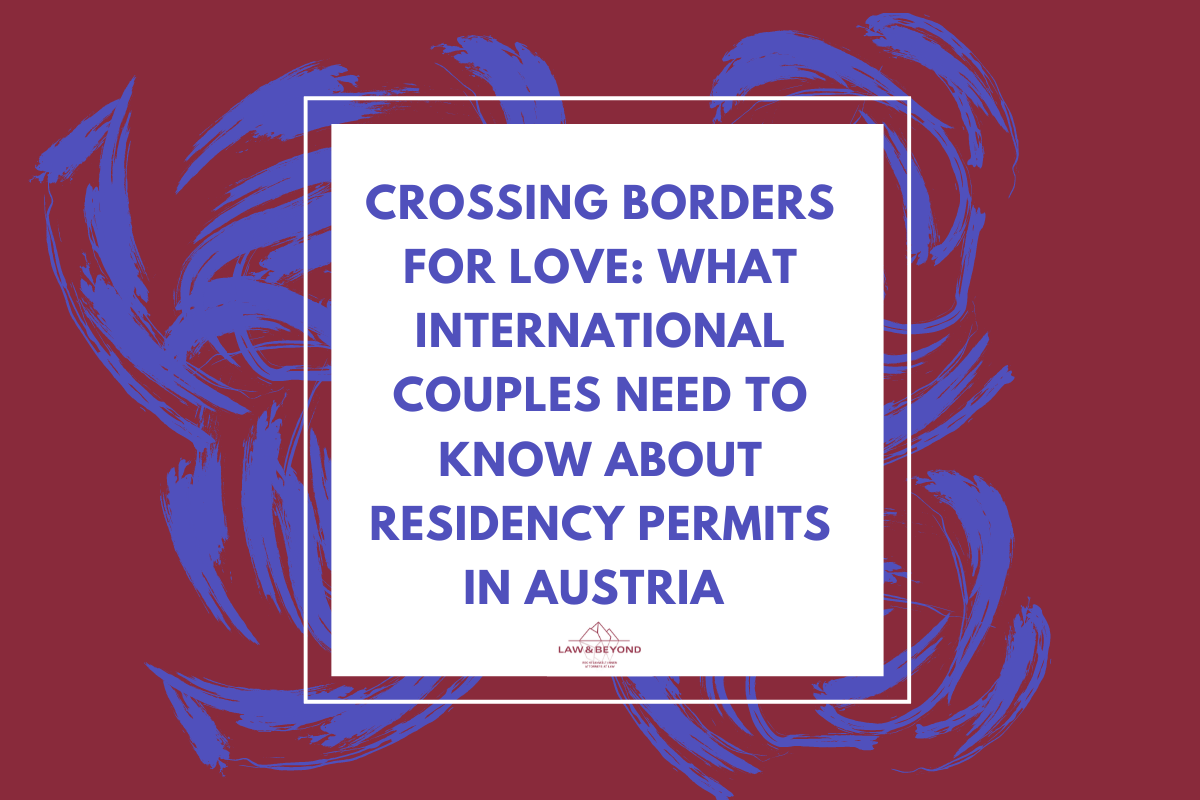Love knows no boundaries, but navigating the legal requirements for international couples can be a daunting task. If you are an international couple with one partner from Austria and the other from a non-EU country, you may have questions about the residency permits available to your non-EU partner. In this blog post, we will discuss the most common questions international couples have about family reunification and partnership visas in Austria, including what permits are available, the eligibility criteria, and the application process. Whether you are newlyweds or have been in a long-term relationship, this guide will help you navigate the legal maze of residency permits and ensure a smooth transition for you and your loved one to your new life in Austria.
Which residence permits can international couples apply for?
International couples where one partner is an Austrian citizen and the other is from a non-EU country may apply for a family reunification residence permit for spouses. This permit is issued for the purpose of family reunification and allows the non-EU partner to reside in Austria with their Austrian partner.
What are some of the general requirements to apply for a residence permit in Austria?
The requirements for applying for a residence permit for family reunification include a valid marriage or registered partnership, proof of housing in Austria, and sufficient financial resources to support
the family without recourse to public funds. The non-EU partner must also obtain health insurance.
Will a marriage concluded in another country be accepted in Austria?
Can same-sex partners also apply for family reunification?
What about couples who opted for a registered partnership instead of a marriage?
Yes, couples who are not married but are registered partners may also apply for family reunification in Austria. Registered partnerships are recognized under Austrian law and offer similar rights and obligations to married couples. In Austria, the rights and obligations of registered partners (in Austrian legalese “eingetragene Partnerschaft”) are stipulated by the Act on registered partnerships (“Eingetragene Partnerschaft-Gesetz”).
How does the application procedure work for family reunification?
The application procedure for a residence permit for family reunification typically involves submitting an application form along with supporting documents. The application can be submitted with the relevant Austrian embassy or consulate in the non-EU partner’s home country. The embassy or consulate will then forward the application to the competent Austrian authorities for processing. The non-EU partner may be required to attend an interview at the embassy or consulate or provide additional information or documents. Once the residence permit is granted, the non-EU partner may travel to Austria and obtain their residence permit from the competent Austrian authorities in Austria.
For citizens of some countries, it is possible to file a residence permit application directly with the immigration authorities in Austria. In such cases, the non-EU partner does not have to first file their application via the Austrian consulate or embassy in their home country.
For foreign documents to be submitted in the application process, it may be necessary t to have them authenticated by the authorities (sometimes plus the Austrian consulate or embassy) in their home countries and translated into German.
The processing time can vary, but typically takes several months.
Will the non-EU partner be able to work when they move to Austria with their Austrian partner?
Would it change anything if the Austrian partner has lived in another EU country before attempting to bring their non-EU spouses to Austria?
Yes, if an Austrian citizen has lived abroad in another EU country, more favorable rules of EU law may apply to the family reunification. These advantages may often include lower requirements to be met, a longer validity of granted residence permits and a right to stay in Austria beyond the period of a granted tourist visa, while waiting for the family reunification visa to be processed.
Do the same rules apply for couples who are not married but in a serious relationship?
Unfortunately, unmarried partners of Austrian citizens who come from non-EU countries do not have the automatic right to enter and reside in Austria. However, if the unmarried couple has been living together in a genuine and lasting relationship similar to marriage for a certain period of time, they may be eligible for a residence permit for cohabiting partners, which can colloquially be referred to as a “partnership visa.”
To be eligible for a partnership visa, the couple must provide evidence of their genuine and lasting relationship, such as joint leases, joint bank accounts, joint bills, and other documents that demonstrate their commitment to each other. The couple must also meet other eligibility criteria, such as having sufficient financial resources to support themselves without recourse to public funds and show availability of a health insurance with coverage in Austria.
However, a partnership visa would not allow the partner to work in Austria. If they wish to work legally , they must first switch to another residence permit, such as a Red-White-Red card (a work and residence permit).
The eligibility criteria and requirements for obtaining a Red-White-Red card for instance can vary depending on the specific circumstances of the non-EU partner and the type of job they are seeking. In general, the non-EU partner must have a job offer from an Austrian employer and meet certain criteria, such as having the necessary qualifications and experience for the job, sometimes also that no suitable candidate could be found within the Austrian labor market or the EU/EEA.
It’s important to note that there may be restrictions on the type of work that non-EU partners can undertake, especially in certain sectors or occupations. Therefore, it’s recommended to seek the advice of an lawyers who specialize both in Austrian immigration and employment law to understand the eligibility criteria and requirements for obtaining a Red-White-Red card, and to explore the available options for legal employment in Austria.


